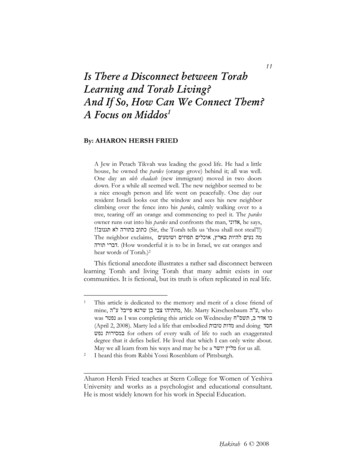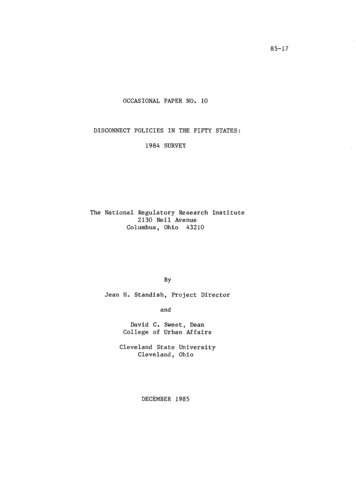
Transcription
Is There a Disconnect between TorahLearning and Torah Living?And If So, How Can We Connect Them?A Focus on Middos111By: AHARON HERSH FRIEDA Jew in Petach Tikvah was leading the good life. He had a littlehouse, he owned the pardes (orange grove) behind it; all was well.One day an oleh chadash (new immigrant) moved in two doorsdown. For a while all seemed well. The new neighbor seemed to bea nice enough person and life went on peacefully. One day ourresident Israeli looks out the window and sees his new neighborclimbing over the fence into his pardes, calmly walking over to atree, tearing off an orange and commencing to peel it. The pardesowner runs out into his pardes and confronts the man, אדוני , he says,!! ( כתוב בתורה לא תגנוב Sir, the Torah tells us ‘thou shall not steal’!!)The neighbor exclaims, אוכלים תפוזים ושומעים , מה נעים להיות בארץ דברי תורה . (How wonderful it is to be in Israel, we eat oranges andhear words of Torah.)2This fictional anecdote illustrates a rather sad disconnect betweenlearning Torah and living Torah that many admit exists in ourcommunities. It is fictional, but its truth is often replicated in real life.12This article is dedicated to the memory and merit of a close friend ofmine, מתתיהו צבי בן שרגא פייבל ע"ה , Mr. Marty Kirschenbaum ע"ה , whowas נפטר as I was completing this article on Wednesday תשס"ח , כו אדר ב (April 2, 2008). Marty led a life that embodied מדות טובות and doing חסד במסירות נפש for others of every walk of life to such an exaggerateddegree that it defies belief. He lived that which I can only write about.May we all learn from his ways and may he be a מליץ יושר for us all.I heard this from Rabbi Yossi Rosenblum of Pittsburgh.Aharon Hersh Fried teaches at Stern College for Women of YeshivaUniversity and works as a psychologist and educational consultant.He is most widely known for his work in Special Education.Ḥakirah 6 2008
12 : Ḥakirah, the Flatbush Journal of Jewish Law and ThoughtA friend of mine was davening with a minyan at Lud airport. Thepeople leading the minyan took every possible opportunity to say aKaddish, adding Kaddeishim after almost every paragraph of tefilahafter the Shemona Esrei. After עלינו a yeshiva man approached oneof the minyan organizers and said to him, “You know, the AruchHaShulchan writes that it is not right to add Kaddeishimsuperfluously. The man heard the yeshiva man out respectfully. Butwhen he was finished, he turned to his friend and exclaimed, חיים ! ( הוא אמר דבר תורה–קדיש Chaim, he said a d’var Torah; Kaddish!”)In a previous article in this journal3 I repeated a story told by RavReuven Feinstein שליט"א in which one of his talmidim who hadaccidentally broken a borrowed tape recorder claimed that he did nothave to pay for the damage because “it was an accident.” Reb Reuvenwas astounded that the boy did not connect the incident to hisstudies. He was learning פרק המפקיד and surely knew that a שואל was חייב באונסין , responsible to pay for accidental damages to a borrowedobject. When Reb Reuven shlit”a asked Reb Moshe ztz”l how thisdisconnect between learning and behavior could happen, Reb Moshetold him that when בחורים learn halachos in Gemara and then witnessthose halachos not being adhered to in their community, they learnthat what they were taught in Gemara is לאו דוקא , not necessarily so.They then fail to apply their learning to life, thus disconnecting theirlearning from their lives.While this “disconnect” exists in many areas, I believe it is moststarkly evident in the area of middos and ( דרך ארץ character traits asexpressed in one’s manners, demeanor, and behavior).In the ever-stranger list of reasons for declining a shidduch(perspective bride), I heard one recently that truly shocked me. Ayoung man declined to meet a girl because she had only onesibling, and he “was afraid of getting stuck with eventually havingto take care of elderly parents.” He wanted to go into a family withmore siblings who would help share the load.I don’t know this young man’s family history and whatexperiences he may have had that prompted this approach toshidduchim, but to me this is a level of selfishness, accompanied by a3Fried, Aharon H., “Are Our Children Too Worldly?” Hakirah, Vol. 4,Winter 2007, pp. 37–67.
Is there a Disconnect between Torah Learning and Torah Living? : 13lack of אמונה ובטחון that should be foreign to a בן תורה . Actually, I donot even know whether the story is at all true, and I certainly hope itis not. However, if such stories are being told in the community, theyseem to reflect a feeling that such thinking exists and that “it could betrue.” It is certainly not what he learned in the words of Chazal or inthe Sifrei Mussar. Where does such thinking come from?On many occasions I have sat with parents whose children werebeing beat up or systematically bullied in school.4 What is alwaysmost disheartening is the school’s response to these incidents. Manyteachers, rabbeyim, and even parents have the attitude that there is notmuch one can do about it either because “you can’t be everywhere atthe same time,” or because “boys will be boys, and you cannotlegislate against human nature.” Rabbeyim who are less kind,sometimes “blame the victim.” In a recent case that I recall, a rebbetold a mother who complained that her son was being beaten up,“Make him normal and the others won’t hit him.” Is training ourtalmidim not to hit a classmate who is somewhat “nebby” or “nerdy”(i.e., socially awkward) too much to ask?A few years ago I sat with a couple who had asked me to do apsychological assessment on their son who was having problems inschool. As a prelude to the assessment I was reviewing their son’shistory with them. In the course of the conversation, they relatedthe following: “Our son, a very sensitive boy, attended a certainvery frum yeshiva where he was being teased a lot. The menahel(principal) suggested that perhaps we should send him to a less frumschool where children tease each other less. So we switched him toa less frum yeshiva where he continued to have problems withacademics ”They said this in a matter-of-fact manner, and with no sense ofirony. I asked them, I ask myself, and I ask the reader, “Is there notsomething wrong with this statement? Should we be accepting of thefact that “the students of a ‘less frum’ school should be more caring4Bullying is, of course, not unique to our schools. As I am writing thisarticle, the New York Times is doing a series on bullying in publicschools across America—unjustified, wicked, and violent bullying.Additionally, teachers and principals in the public schools often seemcallous to this problem. Surely, no one would suggest that we use theirproblems to justify what happens in our schools.
14 : Ḥakirah, the Flatbush Journal of Jewish Law and Thoughtand less cruel to each other?”5 Additionally, if it is unfortunately true,should we not be asking ourselves why?At workshops that I give to teachers on Behavior Management inthe Classroom, I hear teachers and rabbeyim complaining incessantlyabout the level of chutzpa (arrogance) they meet up with, and theirfeelings of helplessness in controlling it.In one sixth-grade classroom a teacher asked one of her students topick a sheet of paper up from the floor. The student’s response? “Idon’t work here, you do!” What’s worse is that the teacher had noresponse to this. She was so flabbergasted by the student’s chutzpathat she was at a loss regarding what to do.In individual sessions with parents and their children, I hearchildren speak to their parents in ways I could not have imaginedpossible. The parents report that what goes on at home is evenworse. Like the teachers, the parents accept this with resignation,chalking it up to 6 בעקבות משיחא חוצפא יסגא , the prediction in theMishnah that in the end of days before Mashiach arrives we shouldexpect an increase in chutzpah. Some are actually afraid to sayanything, frightened as they are by all the talk of children becoming“at risk” and going “off the derech” because their parents were “toostrict.” They remain ignorant of the research literature that showsthat the failure to give children guidelines amounts to “neglect” andis even more harmful to children’s development than strictauthoritarian parenting.7Having contemplated the history of the Orthodox communityover the past forty years, as well as some of my more recent567I don’t know how true that is, but it is certainly the general perception.Many years ago, Torah Umesorah held a session at its convention, titled“Are out-of-Town Children (a.k.a. children from outside of the very frumcommunities of Brooklyn, New York and its environs) better behaved thanthose from in-town, and if so why?” Although no great solutions wereoffered for the problem, nobody at the convention disputed that “outof-towners” were better behaved. The only question was “why?” Whyshould this be? סוטה דף מט עמוד ב .See Bee, Helen and Boyd, Denise, The Developing Child, PearsonEducation, 2007, pp. 370-371, for a brief summary of the research inthis area.
Is there a Disconnect between Torah Learning and Torah Living? : 15experiences in the community, I have come to what seems to be aninescapable conclusion. Namely, that we have not fully connected ourbehavior (i.e., our middos) to the ideals of the Torah because we simply have notcared enough to do so.Mechanchim (educators) have in the last forty odd years broughtabout a sea change in the attitudes, aspirations, behaviors, andlifestyles of an entire generation of young people. Only onegeneration ago, almost every bachur in the chareidi world had to battlehis parents about whether he should stay in yeshiva after high schoolor immediately go to college. This was not true in the chassidic world,but there the question for a not-insignificant minority was whetherthey should go to work at 18 or 19 or stay in yeshiva. In the ModernOrthodox world, few even entertained the idea of putting off collegeand career plans for a few years of Torah study at a yeshiva. Today,virtually every bachur from chareidi high schools, chassidish yeshivaketanos, and many if not most from “Modern-Orthodox” highschools continue in yeshiva after high school. Almost every bachurgraduating from a yeshiva high school today goes to learn in EretzYisrael (if not immediately upon graduation, then within three years);almost every girl goes to seminary, most in Eretz Yisroel, some inAmerica. Amongst the chareidim, only a minority of talmidim or eventheir parents entertain the idea of college at any point. Virtually everyyoung couple stays in kollel for a number of years (including thoseconsidered “Modern” Orthodox). Unlike the trend forty years ago,only a minuscule number of the homes our young couples establishhave a television in them. Very few ever go to a movie or read secularliterature. The standards of tzniut that our women and girls adhere totoday are much more stringent than those of forty years ago, as aperusal of old wedding albums will attest. Our standards for kashruthave also been raised; few today eat ice cream or chocolate barswithout a hechsher. This was quite common in all but the chassidishe andstrongest yeshivish families forty years ago. General adherence tohalacha, at least of Orach Chaim and parts of Yoreh De’ah, has grown.88The interested reader would do well to read Dr. Haym Soloveitchik’sarticle, “Rupture and Reconstruction, The Transformation ofContemporary Orthodoxy,” in Tradition Vol. 28, No. 4, 1994. In thisarticle the author traces an important aspect of the changes I havealluded to.
16 : Ḥakirah, the Flatbush Journal of Jewish Law and ThoughtThus, in the course of one generation, or perhaps two, mechanchimhave accomplished many of their goals. That is, the goals they caredabout.The one area in which we have seen little or no change is in thearea of middos. Some claim that we have actually seen a decline in thisarea. Why is this?In the Klausenburger Yeshiva in Williamsburg there was a RoshYeshiva, Rav Vilner, ztz”l. I heard from one of his talmidim (RebAlter Burech Wieder, olov hasholom) that when walking on the streethe would tell the bachurim, “It looks like it wants to rain,” and thenfollow up with “Do you know how I know? Because it is raining.”He wanted to impress upon his talmidim that the real evidence ofsomeone wanting to do something (e.g., learn) is that he actuallydoes it!By these criteria I am forced to conclude that our community,mechanchim as well as parents, has failed to communicate that middosand derech eretz are important values. We have accepted improperbehavior with an air of disappointed resignation, one that we wouldnot allow in other areas of our children’s development. Our childrenpicked up on our lack of resolve and have reacted accordingly. In thefollowing pages I will outline some of the underlying causes for ourfailure to take more resolute action in this area, and will offer somesuggestions for what we need to do.I. Our “Accepting Attitude” and Resignation to theLack of “Derech Eretz”A father once described to me how in cheder, his son was pusheddown a flight of stairs by some of his rougher classmates. When Iexpressed horror at this he said, “It happens all the time. You can’tchange it. It’s sort of a culture.” I told him that I was familiar withִ ַתּרְבּוּת ֲאנ this culture. It is the culture that the pasuk9 describes as ָשׁים — ַח ָטּאִים a culture of sinners.But why do we accept this? Would we be as accepting of theadage “boys will be boys” if our children snuck into McDonald’s,only occasionally, mind you, just to get a quick taste of “what a Big9 יד , במדבר לב .
Is there a Disconnect between Torah Learning and Torah Living? : 17Mac is like?” Or to use a far less extreme example, would we be astolerant of children who ate a bag of potato chips that had the“other” hechsher, the one we don’t fully trust? Would we say that it’sjust “human nature” to want to eat a bag of chips when one ishungry”?A Possible למוד זכות , a Perceived Limitation on theBuilding of MiddosIn thinking about what the sources of such a laissez-faire attitude tomiddos may be, it occurred to me that mechanchim may be taking ahands-off approach to middos because they recognize the tremendousdemands being made on their talmidim, and feel that asking for morewould be unrealistic.Only once did I have the זכות of being in Reb Moishe Feinsteinztz”l’s study in his home. While I was there the phone rang. RebMoishe picked it up and here is what I heard him say (in translationfrom the Yiddish):“No, I don’t think you need to be מחמיר on that.” (pause) “No youdon’t have to be חושש for that.” (pause) “No, it is not כדאי to be מחמיר like that.” (pause) “No, no,” (pause) “How many חומרות doyou want to load on the back of one woman? She’ll collapse underthe load!”It would certainly seem, from Reb Moishe’s response, that thereis a limit to how many strictures a person can handle.Another way of putting this is that there is a limit to our capacityfor self-control. A person who is trying to control himself fromyelling out in pain because of a toothache will have great difficultysimultaneously controlling his responses to somebody who isirritating him. Empirical research reported by Muraven andBaumeister10 suggests that our capacity for self-control is indeedlimited, and furthermore that self-control saps our energy and tires us.10Muraven, Mark & Baumeister, Roy F., “Self-Regulation and Depletionof Limited Resources: Does Self-Control Resemble a Muscle?”Psychological Bulletin, 2000, Vol. 126, No. 2, 247–259. See also a NYTimes Op-Ed piece published this week on this topic; Aamodt, Sandra& Wang, Sam Tighten Your Belt, Strengthen Your Mind, April 2, 2008.
18 : Ḥakirah, the Flatbush Journal of Jewish Law and ThoughtFor example, people who had to control themselves by not eatingfrom a plate of delicious cookies placed in front of them were lesscapable of exercising self-control on a totally unrelated task. Theycould not concentrate on a set of insoluble anagrams for nearly as longas people who had not had to control themselves by not eating thecookies. The need for self-control is not confined to diets and the like.Self-control affects a broad range of our daily behaviors; concentratingon work or on a lesson requires us to exercise self-control (to makesure we are not distracted), sitting in a classroom and holding ourselvesback from talking to a neighbor requires self-control, and of course,maintaining civility in the face of provocation requires great selfcontrol.Would I be totally off the mark if I were to suggest that onereason for the lapses in civil behavior (middos) of yeshiva and dayschool children is that they are quite simply tuckered out fromexercising self-control all day in school? That they are “collapsingunder the load”? They sit in school, under conditions requiringdisciplined self-control and concentration, for long hours (in the caseof many boys, for longer than their parents sit at their desks at work).They have limited outlets for their natural energy, which they musthold in check all day. Is it possible that rabbeyim recognize this andfeel that after all the boys need to do, asking them to exercise selfcontrol in how they talk to their siblings, their parents, and otherswould be a case of ?תפסת מרובה לא תפסת Is it possible that becausethey feel that “something has to give,” mechanchim make a consciousdecision to let middos education slide? If so, are we not akin to the שומר who properly locks a sheep in a corral, but under a hot burningsun? The שומר is then held responsible when the sheep breaks outand runs away.11 More important, if this is the choice mechanchim feelthey have been forced to make, is it the right choice? I believe it isnot.I believe that we have forgotten or confused our priorities asoutlined in Shulchan Aruch. We tend to come down hard on childrenwhen they lapse in מצוות בין אדם למקום but are more accepting andtolerant when they lapse in מצוות בין אדם לחבירו . The Shulchan Aruch,11See Mishnah and Gemara at the beginning of Perek haKones: בבא קמא נ"ה ע"ב ורש"י שם .
Is there a Disconnect between Torah Learning and Torah Living? : 19Rambam, and the Magid Mishna teach us that our priorities andconcerns need to be reversed.Rambam12 states in הלכות גניבה , and the בית יוסף codified it inShulchan Aruch13 ראוי לבית דין להכות את הקטנים על הגנבה כפי כח הקטן כדי שלא יהיו רגילין . בה וכן אם הזיקו שאר נזקין It is fitting for Beis-Din to hit the young when they steal,accordingly with their strength, so that they do not becomehabituated to it. And so too when they cause other damages.On which the מגיד משנה comments: ואפילו למאן דאמר קטן אוכל נבילות , זה לא מצאתי מבואר אלא נראה פשוט אין בי"ד מצווין להפרישו ה"מ בעבירות שבין אדם למקום אבל בעבירות שבין . אדם לחבירו ודאי מפרישין אותו כדי שלא יארע תקלה על ידו I have not found this halacha (of the Rambam) stated clearly (in theTalmud); however, it seems self-evident. And even according to theamora who says that “when a child is seen eating non-kosher meat,beis-din (i.e., the community aside from his parents who have theobligation of chinuch) has no obligation to separate him from thenon-kosher meat,” that amora is referring only to mitzvot betweenman and G-d, but when it comes to mitzvot between man andhis neighbor, beis-din is surely obligated to stop him so thatno harm comes about through the child’s actions.Clearly, we should be actively engaged in changing our children’sbehavior rather than accepting it with “helpless resignation.” In fact,research shows that despite the limited nature of self-control, it canbe strengthened and built up. Not by letting it go, but by exercising itat appropriate levels, by granting appropriate rest periods forrejuvenation and then exercising it again. We would do well to learnhow to do this with our students (and with ourselves).1213 הלכות גניבה פרק א הל' י - יד החזקה . חו"מ הלכות גניבה סי' שמ"ט ס"ק ה .
20 : Ḥakirah, the Flatbush Journal of Jewish Law and ThoughtIt is Not Just Fighting and it is Not Just Amongst theChildrenThis attitude of “helpless resignation” goes beyond accepting thatchildren will hurt each other. It also extends toward the disrespect anddisregard that children show toward their teachers and other adults.A yeshiva in Brooklyn last year hired an African American to teachhigh school mathematics. The boys in his classes teased andinsulted him with veiled and not-so-veiled racial comments, drivingthe teacher to tears. One of the boys in his class, the child of afriend of mine, complained bitterly about this to his father, whoshared his concern with me. He was so distraught that I decided tocall one of the menahalim (principals) at the yeshiva with whom Ihad a personal acquaintance. After speaking to the principal,however, I was deeply disturbed and disappointed. He assured methat “of course the yeshiva did not promote this kind of behavior,and did not condone it.” Furthermore, they had tried to dosomething about it but were not successful. I suggested that theyeshiva’s response was not strong enough and that had a bachurcome to yeshiva wearing a pair of jeans or sneakers rather than therequired attire of slacks and dress shoes, the hanhalla’s responsewould have been more vigorous. He denied that, though not veryconvincingly. Finally, he told me that, if truth be told, he would nothave hired the teacher in the first place. I asked whether that wasbecause he lacked teaching skills, but he quickly replied, “No, no,he’s a good teacher, but I wouldn’t have hired him because, as weask in our davening, ( אל תביאני לידי נסיון G-d, do not test us). It’s notright placing the bachurim in such a ”!נסיון Is teaching our children not to denigrate and embarrass otherstoo great a ( נסיון test)?!Children interpret their rabbeyims’ and teachers’ acceptance ofviolations of בין אדם לחבירו as an indication that such violations arenot really serious.The 9th grade בחורים of a yeshiva had taken to teasing andotherwise being disrespectful to the yeshiva’s cook, a 73-year-oldchasiddisher yid. The בחורים justified their actions by saying that hewas an ignorant עם הארץ and that they knew how to learn morethan he did. This class had an excellent rebbe with a reputation forbeing a strong בעל השפעה , exerting a strong influence in themolding of his students’ personalities. He was especially known for
Is there a Disconnect between Torah Learning and Torah Living? : 21his ability to deliver strong shmuessen (moral sermons), which he didregularly in class, especially during the time of this story, as it wasthe month of Elul. His shmuessen covered a wide range of topics(including why his 14-year-old charges should not marry a girl whowent to college). They were delivered with great fervor in athunderous voice with much pathos and lasted from about 25 to 40minutes. One day the cook in the yeshiva had a heart attack.Though not necessarily brought on by the boys’ teasing, it broughtthat issue to the surface. One of the talmidim told me that his rebbedid finally tell the boys that it was not right for them to tease anelderly person even if they did know more Torah than he did. Iasked the talmid whether his rebbe actually gave a shmuess on thistopic; did he get excited about it, and how long did his discussiontake? The talmid told me no, it wasn’t a shmuess, he just calmly toldthem and it took about two minutes.The rebbe probably felt that he could not do much about theproblem. Furthermore, he saw the incident as no more than anunfortunate distraction, certainly not part of his curriculum plan.However inadvertently, he not only failed to help the situation, hemade it worse. Children learn from how their teachers react tosituations and how they talk about them. When a rebbe addresses anissue with a lower level of enthusiasm than he appropriates for other“more important” issues, his talmidim internalize what they perceiveto be their rebbe’s value system. Important topics deserve a shmuess.Less important ones do not.How different was the response of the Gaon Rebbe ShlomoZalman Auerbach of Jerusalem to a similar issue:14One Sunday morning Reb Shlomo Zalman gathered hisstudents at Kol Torah and told them: “A terrible thinghappened in my neighborhood and I must make you aware ofit.” The seriousness of Reb Shlomo Zalman's disposition and thesomber tone of his voice only served to intensify their fear that theevent was even more horrendous than their vivid imaginationscould conjure up. Reb Shlomo Zalman related that on Shabbos hehad seen a man dragging benches to the shul for a collation inhonor of his son’s engagement. The man’s son, who was walking athis side, did not so much as lift a finger to help his father. “I could14Related by Rabbi Hanoch Teller in “And from Jerusalem, His word,”NYC Publishing, 1995, pp. 139-140.
22 : Ḥakirah, the Flatbush Journal of Jewish Law and Thoughtnot contain my bewilderment,” the Rav told his listeners, “and Iasked the chassan to explain why his father was doing all of theshlepping. He proudly explained that even where there was an eruv,he himself did not carry on Shabbos and was therefore unable tolend a hand.” This reply enraged the rav. The very idea of so-calledreligiosity taking precedence over honoring one’s father wasanathema to him.II. Our Lack of Focus on This Area: It Just Isn’t Partof the CurriculumMechanchim, having put the topic of building middos “out of mind”(either as a result of feeling helpless, or because they have relegatedthe responsibility to the home), are not fully conscious of how theirinaction, and sometimes their actions, may actually contribute to alack of middos in their talmidim. This is especially true of the הוראות ,the guidance they give their talmidim.In a yeshiva high school a very good bachur chose two strongtalmidim to learn with for two sedarim, and a weaker one to learnwith during the third seder. His magid shiur berated him forchoosing to learn with and help the weaker bachur, saying, “You canshteig a lot more with a stronger chavrusa.” When it comes tochoosing chavrusos for Torah learning, the Rebbe explained, theoperative principle is —חייך קודמים your life takes precedence overany considerations of helping and learning with another possiblyweaker student. He concluded by saying, There is no חסד when itcomes to Torah!I don’t know what the source for this attitude would be. In fact,I’ve heard that gedolim of the previous generation like Reb ChaimShmuelevitz ztz”l taught the precise opposite. Reb Chaim told histalmidim that doing chesed in Torah will grant one the siattah dishmayaneeded for success in Torah. But even if there was a basis for theother approach, should we not be worried that teaching such an“every man for himself” approach to Torah will result in an “everyman for himself” approach to life, and will contribute to ourdeveloping a selfish “dog eat dog” society?!1515In the first סעיף in Shulchan Aruch we are told not to be embarrassedby those who scoff at us in our service of Hashem. The Mishna Berurah
Is there a Disconnect between Torah Learning and Torah Living? : 23Although, as I have already said, this “disconnect” betweenlearning Torah and living Torah is perhaps most obvious in issues of ( בין אדם לחבירו person-to-person dealings), and somewhat less visiblyin issues ( בין אדם למקום person-to-G-d dealings), the “disconnect”exists there as well. As the Chazon Ish16 writes, the one overriding מדה that a Torah-true Jew must have is self-control. To the degreethat one has it, one has it in all areas of life. To the degree that onelacks it, one lacks it in all areas of life. If one seems to have selfcontrol in one area, e.g. in the area of בין אדם למקום , but does nothave self-control in areas of בין אדם לחבירו , then it is an illusion. Itseems so only because the מצוות בין אדם למקום have not “stepped onhis toes” (e.g. kosher meat is easily available, Shabbos is a pleasure),while people do step on his toes constantly. Such a person willtransgress עבירות בין אדם למקום as soon as they “step on his toes.”We say in our daily tefilos, ותלמדם חוקי חיים לעשות רצונך בלבב שלם —“and you taught them (our forefathers) a living Torah, to do yourwill wholeheartedly.” Torah is meant to be a living Torah, a guide forlife. How can we better connect the two—Torah and Life?In Search of an Answer:I would suggest that the disconnect between learning and living inthe area of middos needs to be addressed at four different levels. Eachof these involves some misconceptions we have about thedevelopment of character traits and behavioral controls, or somemisconception or deliberate forgetting of its importance. The firstthree speak specifically to Torah and middos; the fourth addressesconnecting Torah and living in a more general way.16comments: ועכ"פ לא יתקוטט עמהם מפני שמדת העזות מגונה מאד ואין ראוי להשתמש ממנה כלל אפילו בעבודת הש"י כי יקנה קנין בנפשו להיות עז אפילו שלא במקום עבודתו ית' ועיין בבה"ל . “But he should, in any case, not enter intodisputes with them, for audacity is a very despicable trait and shouldnot be used in the service of Hashem, because the person is likely tobecome habituated to the trait and use it even in his daily dealings withothers.” This fear of becoming habituated to negative behavior patternsis well-established in our tradition. Why do we forget this in the casesdescribed? ו - סעיפים א , ספר אמונה ובטחון פרק ד .
24 : Ḥakirah, the Flatbush Journal of Jewish Law and ThoughtThe four areas we will address are:1. Our understanding of the development of character, and the roleof learned behavior.2. Our awareness and understanding of the importance of RoleModels as demonstrated by Social Learning Theory.3. Our misunderstanding of how morality and ethics are taught.More specificallya. The realization that cognition, understanding of morality,is not sufficient.b.
This fictional anecdote illustrates a rather sad disconnect between learning Torah and living Torah that many admit exists in our communities. It is fictional, but its truth is often replicated in real life. 1 This article










